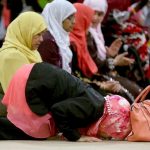Reciting Quran & Tawaf: Women in Menses Excluded?
In the previous part, Dr. Jasser Auda discussed the scholars’ opinions regarding the permissibly of visiting mosques for menstruating women. In this part, he investigates whether a woman in period is allowed to recite the Quran and do Tawaf. As for reciting the Quran by a menstruating woman or ajunubperson, the best view I have ever read on this issue is that of Ibn Taymiyyah and his disciple Ibn Al-Qayyim (may Allah shower their souls with mercy). Ibn Taymiyyah said, As for reciting the Quran by a junub person or a menstruating woman, scholars have three opinions, one of which is that it is permissible, and this is the opinion of Abu Hanifah and the famous opinion in the Shafi`i and Hanbali schools. Another opinion is that it is impermissible for thejunub person, yet permissible for the menstruating woman either generally or in case she fears that she might forget it. This is the opinion of Malik, one of the opinions reported from Ahmad and others. For, no authentic Hadith is reported from the Prophet (peace and be blessings be upon him) on reciting the Quran by a menstruating woman. The only Hadith is that narrated from Isma`il ibn `Ayyash from Musa ibn `Uqbah from Nafi` from Ibn `Umar that he said, “Neither a menstruating woman nor a junubperson should recite anything from the Quran”. This Hadith, which is reported by Abu Dawud...
Read More

